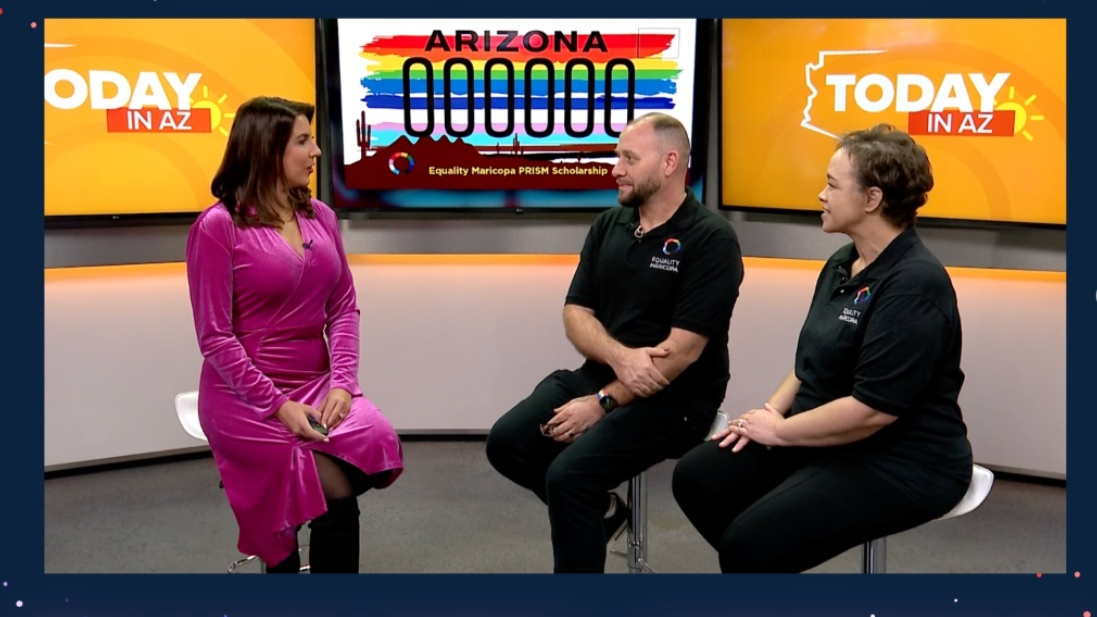Phoenix LGBTQ+ Community Suspicious After Sports Tournament Broken Up by Park Ranger, Police
Excessive intervention by police officers and a Phoenix park ranger during an LGBTQ+ sports tournament Sunday night left players uneasy and confused.
Mesa Rep. Lorena Austin is trying (again) to get a license plate bill passed to aid students after it has met all the required legislative rules. Republicans appear to be blocking it.

Like beer? Rock ’n’ roll? Neutering your pet? There’s a license plate for that. But backing LGBTQ+ students with college scholarships? This seems to be a bridge too far for some Republicans to cross.
Two committee chairs, Rep. Leo Biasiucci (R-Havasu City) and Sen. Kevin Payne (R-Peoria), have yet to assign consideration for two bills that would create a specialty license plate benefitting a scholarship program run by Equality Maricopa, a volunteer-run employee and college student association.
Biasiucci is the Arizona State House Transportation Chair, while Payne is the Senate Public Affairs Chair. Both men have been given bills that aim to push for the state specialty plate, but have yet to schedule them for public debate or input—a tactic committee chairs and chamber leaders use to bypass bills they don’t want heard.
Both men didn't respond to comment before publishing.
While at least one Arizona-based hate group has found no problem in getting tens of thousands of dollars each year through their specialty plates, Equality Maricopa appears to be having a harder time. The organization's President Jay Franzen said he believes the opposition was rooted in discrimination.
Not scheduling the bill to be heard in committee is not a new roadblock. Last year, Rep. Lorena Austin (D-Mesa) proposed similar legislation, and then-House Transportation chair Rep. David Cook also didn’t put it on the committee calendar.

Austin tried advancing the bill during a joint session, however, two Republican lawmakers opposed it. Now, they’re back with HB 2531, a proposal for an LGBTQ+ license plate that would support Maricopa Community College’s PRISM Scholarship through Equality Maricopa. Sen. Analise Ortiz (D-Phoenix) has filed a companion bill in the Senate.
Under a 1989 law, organizations seeking specialty plates must acquire $32,000 for production and design, and win legislative approval. Equality Maricopa spent four years collecting money at Pride events and partnering with businesses like Arizona Wilderness to hit the target, finally succeeding last year. It worked with Austin to draft and sponsor the bill.
Despite following all the rules, the measure didn’t make it out of its first committee. When Austin tried attaching it as an amendment to another specialty plate bill, Reps. Matt Gress (R-Paradise Valley) and Neal Carter (R-San Tan Valley) pushed back.
Carter incorrectly claimed the plate was “discriminatory” because the scholarship is exclusively for LGBTQ+ students. Gress—the legislature’s only openly gay Republican—rejected the amendment on procedural grounds, arguing it needed to remain in its original form.
The amendment failed in a voice vote.
“It was just kind of a slap in the face, really, to think somebody from my own community was just going to deny our students the opportunity to go to school a little bit cheaper,” said Franzen.
While more than 90 LGBTQ+ and allied students applied for a PRISM Scholarship, Equality Maricopa could fund only 14 for the 2024-2025 academic year. A specialty license plate, Franzen said, could expand scholarships to hundreds more.
“My dream for once this passes is that everybody that applies for this scholarship will be granted a scholarship,” Franzen said.
License plates for causes—political, social, and everything in between—have become staples on Arizona’s roads. The Department of Transportation oversees more than 100 specialty plates, with $17 of every $25 plate fee going to designated nonprofits.
Yet, the approval procedure for these plates has long been fraught with controversy.
In 1992, lawmakers created a second pathway for nonprofits to apply for plates through the Department of Transportation. This law established a License Plate Commission to review applications from qualifying nonprofits, originally requiring at least 500 members (later reduced to 200).
Former Republican state Rep. Steve May, who served from 1998 to 2002, said the commission was designed to take politics out of the procedure.
“We created a mechanism that took the legislature out of the decision-making process and made it an administrative process with ADOT,” May said. “That, I think, is the right way to do it.”
But in 2008, the U.S. Supreme Court ruled the commission violated the free speech rights of Arizona Life Coalition, an anti-abortion group denied a “Choose Life” plate. Arizona Life Coalition, backed by the conservative Center for Arizona Policy and Alliance Defending Freedom (ADF), had its denial overturned.
The following year, then-state Rep. Andy Biggs sponsored a bill that abolished the commission, putting specialty plate decisions back in lawmakers’ hands.
Ever since contentious nonprofits have faced few challenges in getting their plates approved. ADF—a Scottsdale-based organization labeled an anti-LGBTQ+ hate group by the Southern Poverty Law Center—has raised over $1.2 million since 2019 through its “In God We Trust” specialty plate, according to state records.
An earlier version misstated who led the committee for Senate Public Safety. Sen. Kevin Payne (R-Peoria) is the Senate Public Safety Committee Chair not Sen. David Marshall (R-Snowflake), as he held the post last session.
LOOKOUT Publications (EIN: 92-3129757) is a federally recognized nonprofit news outlet.
All mailed inquiries can be sent to 221 E. Indianola Ave, Phoenix, AZ 85012.